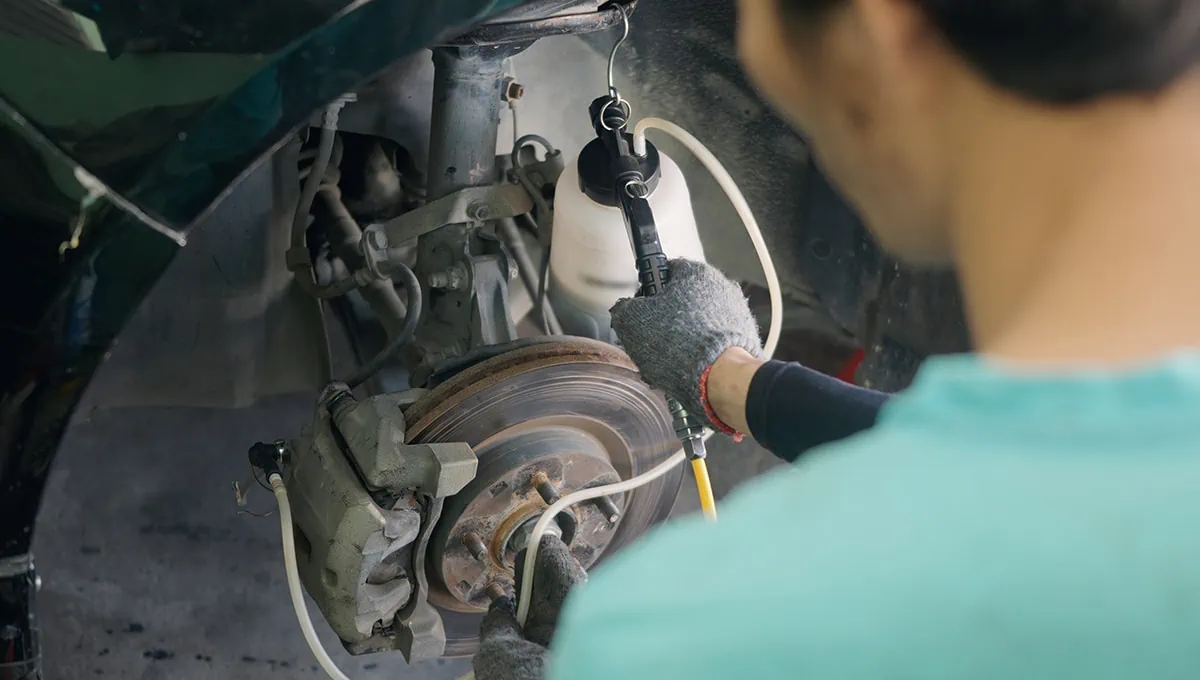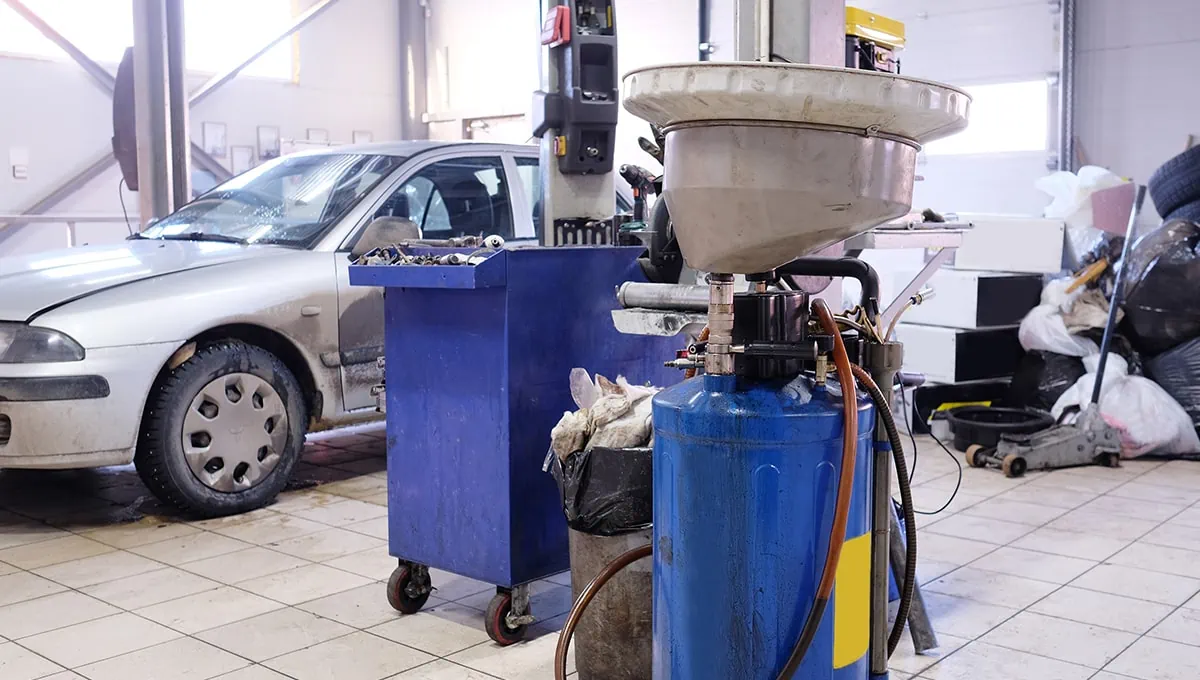Navigating the labyrinth of the regulations surrounding brake fluid disposal and other hazardous liquid waste disposal is not merely a matter of compliance; it’s a critical aspect of operational excellence for vehicle repair businesses in the UK. If you’ve ever wrestled with questions about effectively managing spent brake fluid or been concerned about spill management, this guide is for you. Brake fluid is considered hazardous waste with quite a few complexities that necessitate a specialised approach. Mastering its correct removal not only elevates your environmental impact but also fortifies your workshop’s standing as a reputable and law-abiding establishment.

Outsource your brake fluid waste disposal
Click below to get a quote!
Get a quote
Beyond Compliance: The Ethical and Business Imperatives for Proper Disposal
- Environmental Protection: Brake fluid is designated as hazardous and can have detrimental effects on soil and water sources if released into the environment. Such contamination can adversely affect aquatic life, compromise ecosystems, and degrade water quality.
- Public Health: Brake fluid is toxic and poses health risks if ingested or upon skin contact. Failing to dispose of it appropriately can lead to accidental exposure, thereby endangering public health.
- Legal Implications: In the UK, environmental regulations like the Environmental Protection Act 1990 and the Hazardous Waste Regulations 2005 stipulate the correct discarding methods for hazardous materials such as brake fluid. Non-compliance can result in substantial fines, legal repercussions, and damage to your reputation.
- Social Responsibility: Automotive workshops bear a social obligation to operate in an eco-friendly manner. Proper waste management services is integral to maintaining community trust and wellbeing.
- Economic Considerations: Effective waste disposal strategies can avert expensive clean-ups and legal issues. Moreover, eco-friendly practices can also enhance customer trust and loyalty.
In short, the responsibility for proper brake fluid disposal in the UK transcends mere legal obligations. It’s about acting ethically for the wellbeing of the environment, public health, and the wider community.
Best Practices for Storing Brake Fluid in Your Workshop
Short-Term Brake Fluid Storage:
- Monitor the Level: When filling containers, always leave about a half-inch from the top to avert overflow.
- Be Aware of Toxicity: Is brake fluid toxic? Yes; store it well away from consumables and out of customers’ reach.
- Utilise Original Containers: Avoid accumulating brake fluid. It’s advisable to keep unused and old brake fluid in its original container to minimise contamination.
- Avoid Mixing: Do not combine brake fluid with engine oil or other fluids, as this can compromise its quality.
Long-Term Brake Fluid Storage:
- Prioritise Safety: Given its toxic properties, always store brake fluid in a well-ventilated area, shielded from direct sunlight and heat and know what to do if brake fluid spills.
- Inspect Regularly: Routinely check storage areas for old brake fluid accumulation. Clean up any spills immediately especially when it comes to brake fluid waste.
- Proper Disposal: For old or contaminated brake fluid, do not store it. Ensure its correct discarding by taking it to a local recycling centre or utilising services from auto supply stores.
- Safety and Regulation Compliance: Auto supply stores that store large quantities of brake fluid should adhere to local guidelines and clearly label the storage area as containing hazardous materials like brake fluid.
- Innovative Storage: Consider sealed storage systems that mitigate the risks of leaks and evaporation, particularly if you have large amounts of unused brake fluid.
By adhering to these best practices, you’ll elevate the safety and efficiency of your workshop while complying with local laws.
Safely Handling and Transporting Brake Fluid: Considerations You May Have Overlooked
Both brake fluid and motor oil are classified as hazardous and necessitate cautious handling. Emptying them into storm drains or septic tanks is strictly prohibited. As a business owner, you can’t use a household hazardous waste disposal facility if you want to avoid excessive fines. Consulting local authorities can offer specific guidance however it’s best to hire professionals to safely dispose any hazardous liquid waste such as: brake fluid, residue from oil change, excess brake fluid, used engine oil, motor oil etc. Relying on experts not only protects the environment but is also cost-effective in the long run. To ensure maximum safety and avoid hefty fines, employing a professional waste management company is strongly recommended.
Break Fluid Disposal
Need to dispose brake fluid or used engine oil? Get in touch!
Get a quote

Creating a Sustainable Disposal Strategy Through Partnerships
When considering the formation of a long-term partnership with a waste management firm such as Inspire Waste Management for liquid waste removal, including brake fluid, there are several questions that business owners should ask to ensure the partnership aligns with their operational needs and regulatory requirements.
- Brake Fluid Removal Protocols: What are your specific procedures for having brake fluid removed from our premises?
- Recycling Centres: Do you collaborate with certified recycling centres for the responsible disposal of brake fluid and other hazardous materials, or is it treated in-house?
- Cost-Saving Strategies: Are there any volume-based discounts or contract terms that could help us save money on regular liquid disposal pickups?
- Material Reuse: Can you buy brake fluid back for recycling or repurposing, and under what conditions?
- Supply Chain: Do you also supply new brake fluid, and are there any advantages or discounts for combining these services?
- Scheduling and Timeliness: How flexible are your scheduling options to accommodate the volume of refuse generated by our operations, including new brake fluid and other liquids?
- Compliance and Reporting: How do you ensure compliance with UK environmental laws and regulations, and do you provide comprehensive reports for our records?
- Adaptability: There is so much conflicting information about regular trash and How well is your service equipped to adapt to changing regulations and waste management technologies?
In today’s complex world, it’s easy to underestimate the various factors involved in properly disposing of automotive waste. One major problem is the misconception that it’s acceptable to drain excess product, like fresh coolant, into a storm drain; this is unequivocally a bad idea. The way waste is treated can totally vary based on the treatment facility. For instance, some facilities use large tray systems to absorb water from disposing materials, while others have different methods. Another good rule of thumb is never to dispose of waste until it is completely dry, as some treatment facilities might even pay you “green bills” to receive dry refuse, giving you a better shot to receive money back from recycling. Understanding these complex issues and other factors such as vehicle-specific waste requirements is crucial for navigating the intricacies of lawful and responsible disposing.
Liquid waste disposal
Call us and get a quote for Waste Management Services
Get a quote





